|
Swiss Road
St. Leonard
Hythe
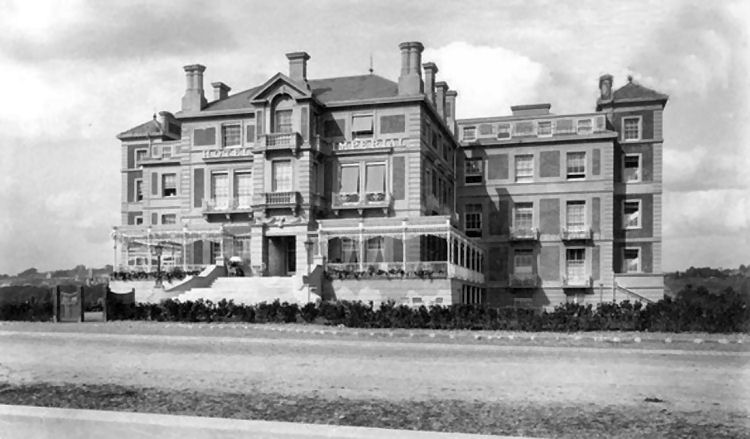
Above photo 1902. |
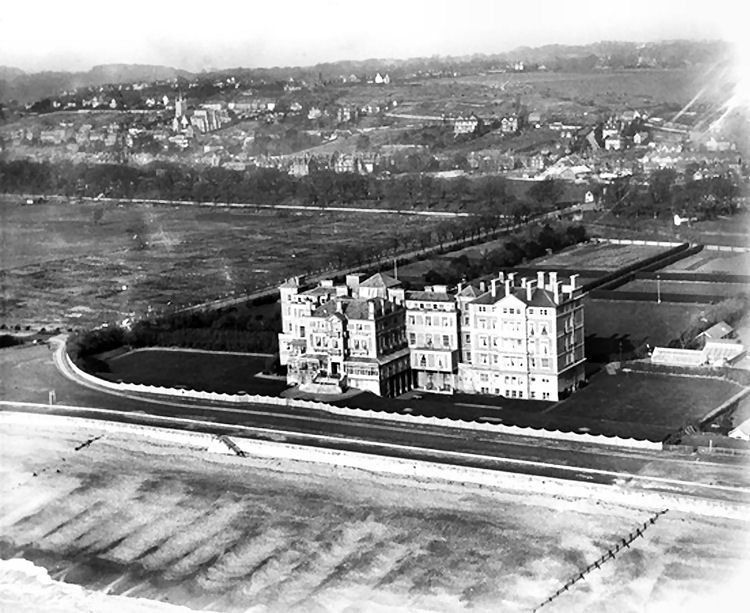
Above photo 1920. |
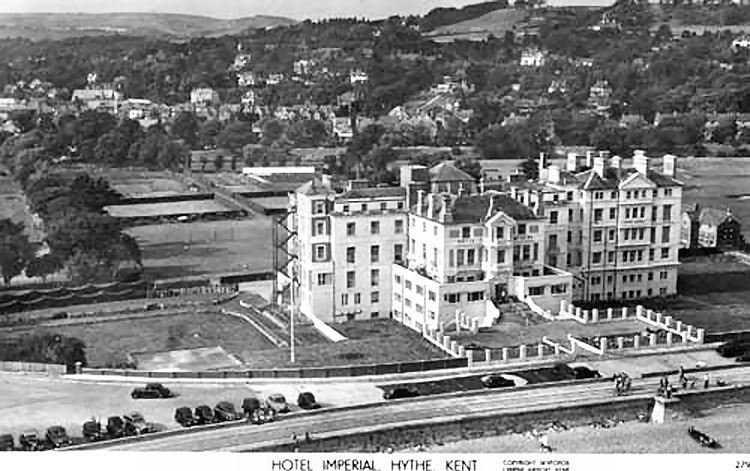
Above postcard, date unknown, kindly sent by Debi Birkin. |
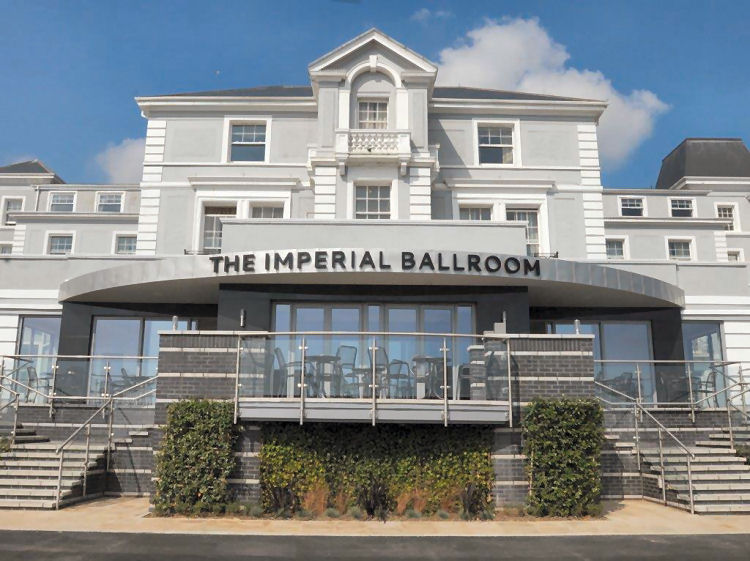
Above photo, 2017. |
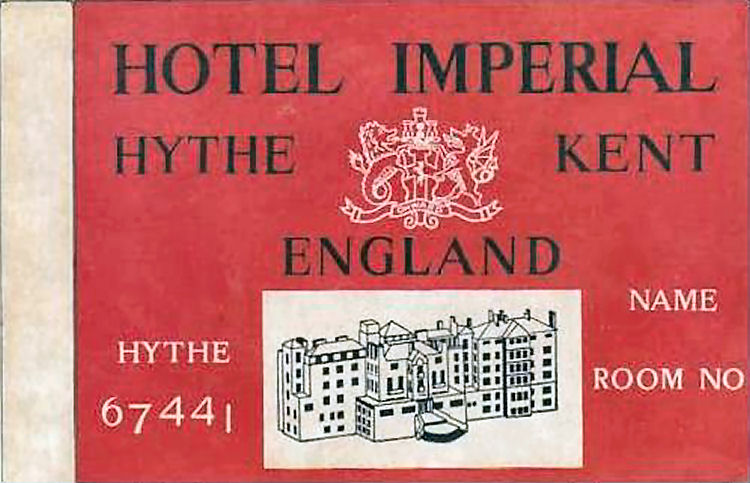
Above matchbox, date unknown, kindly sent by Debi Birkin. |
|
From the Folkestone Herald & Hythe & Sandgate Standard Visitors List, 13th July 1904.
THE HOTEL IMPERIAL
HYTHE.
On sea front facing due south.
Furnished and Decorated by Smee & Cobay, London.
The Hotel Gardens and Grounds of 7 acres nicely sheltered and
artistically laid out are unequalled at any seaside Hotel in England.
The Hotel orchestra plays at Luncheon and Dinner (both open to
Non-Residents), and in the lounge during the evening; also on the Lawns
of the Hotel, where Afternoon Teas are served.
A Dance is held in the Hotel every Saturday night during the Season
open to Non-Residents dining at the Hotel.
The Hotel is within easy reach of Folkestone by Bus', Motor or Tram.
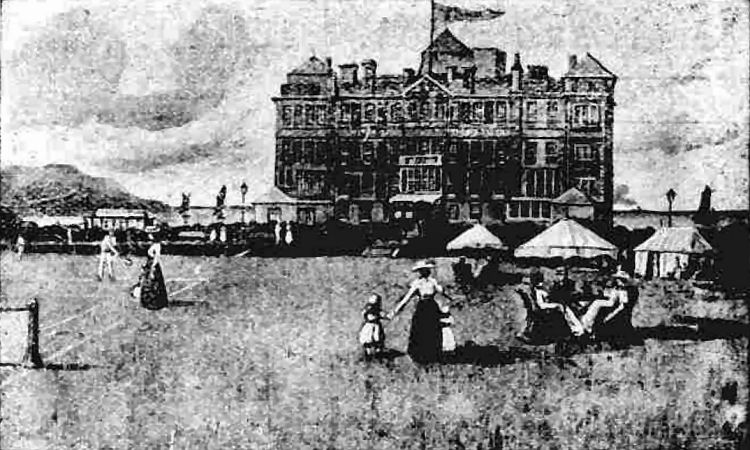
Above print, Hotel Gardens and Grounds.
|
|
Folkestone, Hythe, Sandgate & Cheriton Herald, Saturday 12 September 1908.
HOTEL IMPERIAL, HYTHE.
One of the most luxurious and the only Hotel in England with its own
Golf Links in the Hotel grounds.
Terms for Play.
Tickets for which can be had only at the Hotel Bureau, North entrance,
which must be produced when required by the Green Keeper, or other
official of the Hotel Company.
Hotel visitors 18 Holes 1/3
Non Residents 18 Holes 1/6
Hotel visitors Per Day 1/6
Non Residents Per Day 2/-
Hotel visitors Per Week 6/-
Non Residents Per Week 7/6
Hotel visitors Per Month 18/-
Non Residents Per Month 22/6
Caddies for 9 holes, 5d, for 8 holes, 9d.
Professional playing or Coaching 1/- an hour.
Sunday Play.
Regimental Band on the Lawns on Sunday afternoons during the Season and
Tennis and Croquet Tournaments in September. The Hotel is within easy
reach of Folkestone by Bus, Motor or Tram.
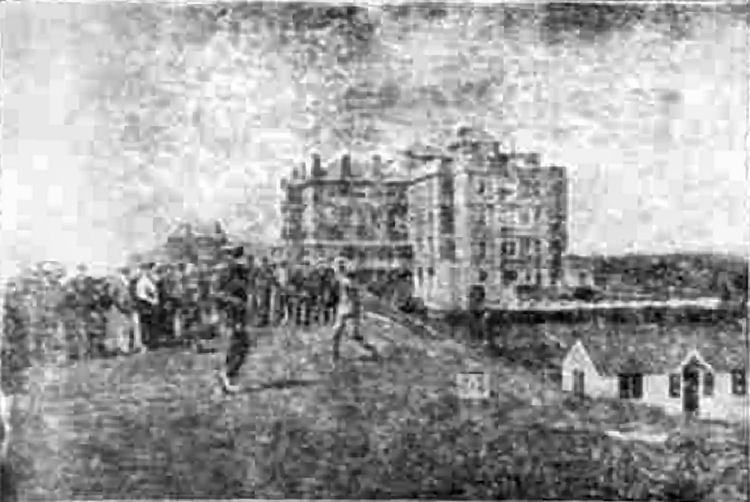
|
|
Folkestone, Hythe, Sandgate & Cheriton Herald, Saturday 17 October 1914.
The Belgian wounded. 3000 distributed. Hotels requisitioned. Moor Hall School to be used.
The first contingent of wounded Belgium soldiers arrived on Saturday,
and were conveyed in 16 motor cars to the Voluntary Aid Hospital,
Ramsgate. On Tuesday 120 arrived in the afternoon on the Invicta and
they were taken to Shorncliffe Military Hospital in three of the red
motor buses and several R.A.M.C. ambulance cars, being conveyed thence
to the Bevan Home, Sandgate.
In the evening 1000 arrived unexpectedly, and the task of distributing
them all was no light one. Several hundred were dispatch by train to
Ramsgate, Margate, Canterbury, Bromley and Bickley. 170 was sent to the
Royal Victoria Hospital, and as the ordinary patients could not be
disturbed, beds had to be made up in corridors for some of the wounded.
Captain Brandreth Gibbs, assistant County Director of the Voluntary Aid
Detachments, who had been appointed to take charge of the transport of
wounded arriving from the harbour, commandeered the Hotel Metropole in
the name of Colonel Wilson, R.A.M.C. These two officers have been
working in cooperation with Mr. Bennet Goldney, M.P. To convey the
wounded to the hotel-hospital all the public motors and other motor
vehicles in the town were also commandeered, and the long string and
vehicles waiting outside the harbour extended beyond the "Pavilion
Hotel." The worst cases were conveyed in the R.A.M.C. ambulance cars.
Another 1000 wounded arrived about 10 o'clock and they slept on board,
being taken in the steamer to Dover the next morning, but as that town
could not accommodate then they were brought back to Folkestone. Some
was sent to the Military Hospital at Shorncliffe, while others were
distributed amongst various Kent and Sussex Towns by train. It was also
decided to commandeer the "Hotel Imperial," Hythe, and 200 were sent
there in motor buses.
The number taken to the "Hotel Metropole" was 600 and the doctor's were
engaged far into the night in attending them. The place has been
completely equipped for hospital purposes. The lesser wounded men can be
seen about the hotel during the day, while many of those unwounded or
with minor wounds have been about the town, in many cases in company
with a British comrades in khaki. Regimental emblems have been freely
exchange. Yesterday 150 of the unwounded Belgians were removed from the
"Metropole" to the Napier Barracks, Shorncliffe.
At the Bevan home there are 250 wounded.
The Morehall Schools have been commandeered as a hospital, and 100 beds
will be in readiness there today. The Hon. F. M. Daly is the commandant,
and Dr. Dodd, Chief Director of the V.A.D., is in charge of the medical
arrangements.
At Beachborough, near Lyminge, the resident of Sir Arthur and Lady
Markham, there is a large number of wounded Belgians.
Messrs. Bobby and Company, Ltd., have offered a portion of their newly
acquired premises in Sandgate Road, which they intend converting into a
drapery emporium, for use as a hospital if required.
An appeal for cigarettes for the Belgium wounded in Folkestone has met
with a gratifying response. A big case of cigarettes was sent to the
Mayor by Mr. C. Willmott, of London, and his Worship has distributed
them.
Mr. And Mrs. Blott, manager and manageress of the "Hotel Imperial,"
Hythe, wish on behalf of the Belgium soldiers at the hotel, to thank the
many ladies and gentlemen who have kindly sent gifts for the wounded.
The articles received include 100 pairs of socks, 75 shirts, several
sleeping suits, a very handsome present of boots, shoes, and slippers,
3025 cigarettes, etc. One Gentleman is lending his motor car for the
wounded to take drives in, and a lady has send a gift of 200 pears.
|
|
Folkestone, Hythe, Sandgate & Cheriton Herald, Saturday 31 July 1915.
A perfect Blaze.
Richard Henry Blott, the manager of the "Hotel Imperial," Hythe, was
summoned for similar offences on the 7th inst. and 24th inst. He pleaded
not guilty to the first offence, and guilty to the second offence.
Mr. Bracher, of Maidstone, who appeared to prosecute on behalf of the
Chief Constable of Kent, said the case was a very serious one, and he
asked the Bench's very serious notice of it. The case would show whether
the regulations should prevail or whether Mr. Blott should prevail. It
was not a case like the one they had just settled. Here was a case where
continued warnings had been given to defendant, where his attention had
been called to the order several times, and where he had been told on
several occasions that he had neglected to shade his lights in his
hotel. Very soon after the first summons was served on defendant he
committed another offence, and another summons was served upon him. The
first summons had very little effect upon defendant. So that Mr. Blott
should keep the law in future he would ask the Bench to inflict a very
severe punishment. As they knew, the fine could not exceed £100 or 6
months' imprisonment, and he suggested that this was a case which called
for some very serious notice. Many complaints have been made against the
hotel. The lights of the hotel had been visible from Dymchurch and the
hill. The whole object of the order was to prevent any light showing so
that they could be an aid to enemy aircraft.
Reginald H. Gordon, of Seabrook Road, Hythe, a special constable, stated
that on the 7th of July at 11:15 p.m. he was in the vicinity of the
"Imperial Hotel" in company with John Lawrence, another special
constable. The lights on the west wing of the hotel were not shaded.
That portion of the hotel faced Dungeness, and it was a "perfect blaze."
These lights were coming from the first and the second floors. In the
entrance hall, too, there was a very bright light indeed. It was within
witnesses knowledge that defendant have been previously warned.
John Lawrence, of Victoria Terrace, Seabrook, a special constable, said
he was with the last witness on the 7th July, and gave corroborative
evidence.
P.C. Wild deposed that on the 26th January, with P.C. Gordon, he saw
defendant and told him that a new order had been issued, which stated
that no lights were to be visible outside. He told defendant about the
basement, and he told him that the blind would want drawing more.
Sergeant. Smith said that on the 5th of April, with P.C. Prosser, he
went to the "Imperial Hotel" and told Mr. Blott that there was too much
light.
Detective Constable Kenwood said on the 10th June he warned the
defendant about the lights. He said to defendant. "You must take this as
a warning. If it occurs again, you will probably be summoned." On the
24th inst., about 10 p.m., he was close by the hotel and saw a bright
light shining from the dining hall. That window faced the sea, and the
lights were showing right out to sea. Sergeant. Beckenham, of the Kent
Cyclist, was with witness. He did not see defendant then.
Sergeant Buckingham said on the night of the 24th July he was with the
last witness. He saw a bright light shining out in the direction of the
sea. It was coming from a window on the ground floor of the hotel.
Defendant said with regard to the light on 7th July he went out with a
special constable. It was very rough that night. He went round, and he
saw several windows where the light could be slightly seen. There were
lights in several windows. The blinds in the windows, however, were
down, and there were also thick curtains. The night being warm, although
it was rough, several of the windows was slightly down, and consequently
the wind blew several of the blinds aside now and again. He could only
say that since the order come out he and his wife for done everything
possible to comply with it. He did not admit that the light was
brilliant. The hotel had been very busy, and 75% of the visitors were
military. There had been notices put in every room with regard to the
lights, which showed that they did everything possible. It was not
possible every time to go into a person's room and put the blinds down.
They had about 325 windows in the building, and they were generally
about 100 people in the place. The persons in the room might easily go
and open the windows and put up the blinds.
The Bench, after a short deliberation in private, returned, and the
Chairman said they found defendant guilty in both cases. It was the wish
of the Bench to let the public understand that next time in cases like
the one they were dealing with the fines will be much more severe. They
were going to deal very leniently with defendant. In the first place he
would be fined £1, and in the 2nd he would be fined £4. He must
understand that if he did not take notice he will be fined much severer
next time. The Bench also allowed to 2s. 6d. each for the special
constables expensive.
Mr. Blott paid the money, £5 5s. in all.
|
|
Folkestone, Hythe, Sandgate & Cheriton Herald - Saturday 04 March 1916.
DEATH. BLOTT.
On 26th February, at "Hotel Imperial," Hythe, Richard Henry Blott, aged 42 years. |
|
From the Dover Express, 1 August, 2016. By Dean Kilpatrick.
Champagne lifestyle is celebrated at bar.
Imperial splendour aims to enhance hotel’s sea views
A GLITZY champagne bar has been formally opened at a hotel in Hythe.
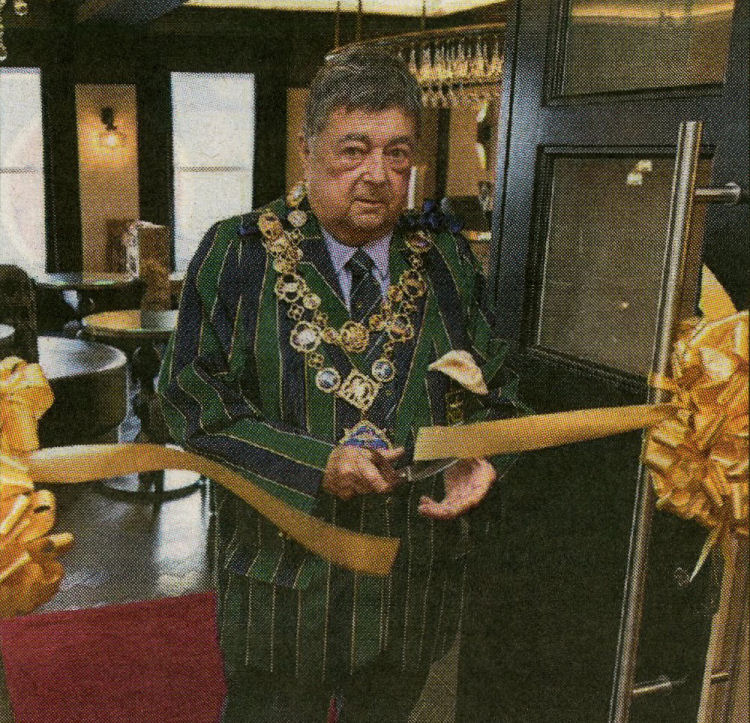
CUTTING THE RIBBON: Mayor of Hythe Michael Lyons officially opens the
bar.
The Moet & Chandon Champagne Bar was unveiled at the Hythe Imperial by
town mayor Michael Lyons last Thursday and is now open for business.
Bosses at the hotel have described the facility as a treat for those
“with a taste for the finer things in life”.
General manager Denise Vas said: “We’re very proud that the Hythe
Imperial is the home of Moet & Chandon in Kent.
“It really is a glorious spot to relax and enjoy a glass or two of
bubbly while taking in the magnificent sea views.”
The bar is open to the public from Wednesday to Sunday, while it is also
available for hire for private functions on Monday and Tuesday.
The Hythe Imperial is continuing its refurbishment, with work on its
third and fourth floor due to commence in January 2017 and January 2018
respectively All of the work is due to completed by May 2018.
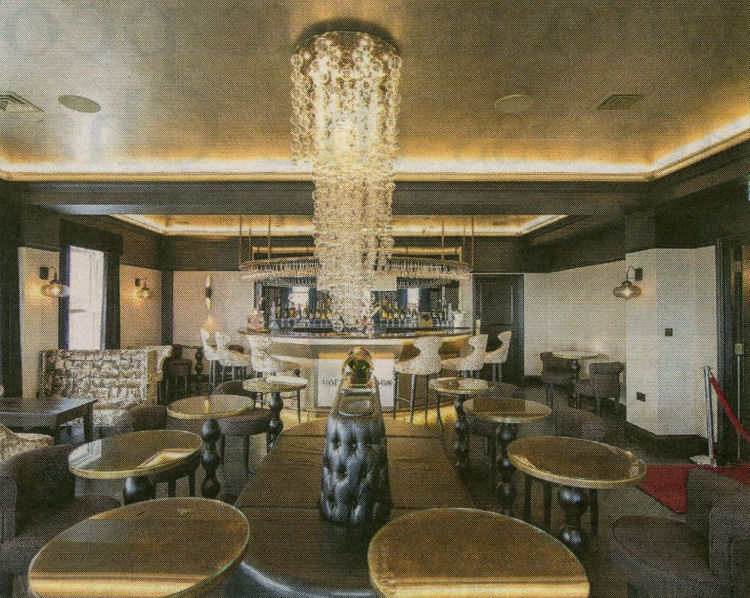
GLORIOUS: The Moet & Chandon Champagne Bar
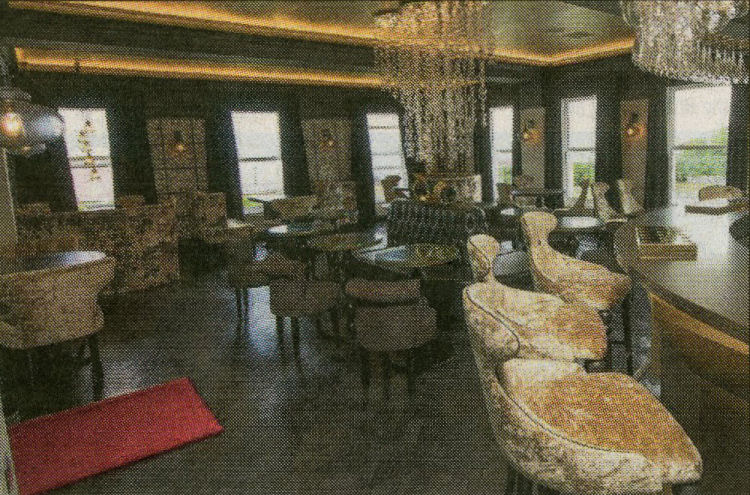
TREAT: The bar offers a refuge for those with a taste for the finer
things.
|
|
From the Dover Express, 27 July 2017.
It s all about the flavour and not about the heat.
In our continuing search for the best curry house in Dover, Folkestone
and Thanet, we visit the Holy Pundit at the Hotel Imperial in Hythe.
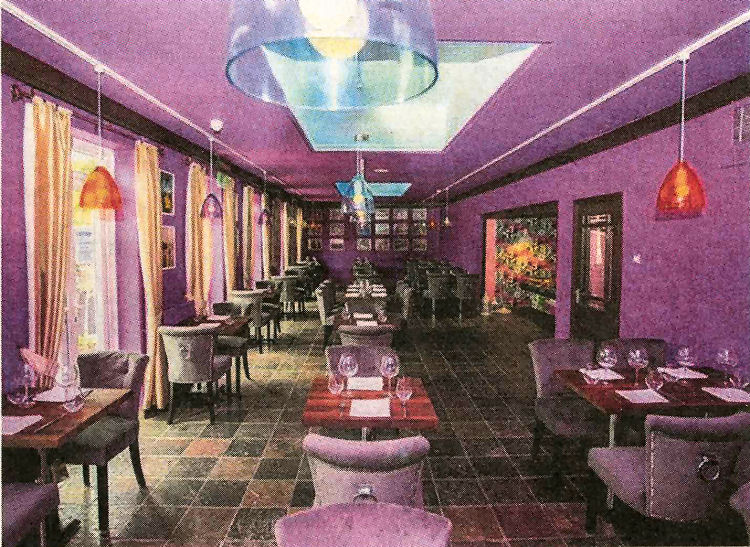
OFFERING customers a “fine dining experience” in Hythe and aiming to
bring a high standard to every dish, this restaurant is renowned for its
quality and attention to detail.
The philosophy is to make and “do what we eat at home and in India. It’s
all about the flavour, not the chilli or the heat.”
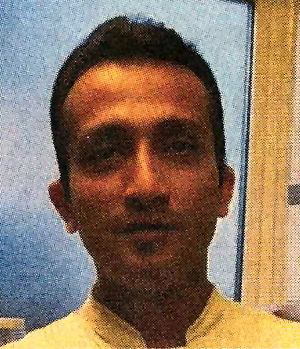
Run by Saurabh Jain alongside business partner and head chef Saurav
Chakraborty, The Holy Pundit offers a “mixing of continental cuisine
with Asian food”.
The curry house is rated three out of 61 restaurants in Hythe on
Tripadvisor, with 89 of its 99 reviews being starred as excellent. It
also received a “very good” food hygiene rating of 5 - the best
available - in its most recent inspection.
The restaurant’s current selection of dishes is a joint effort from the
business partners.
“At first I planned the menu but, myself and Saurav launched the current
menu together.”
Head chef Saurav worked in Ireland before being asked by Saurabh to come
to Hythe and create something “unique” at the Hotel Imperial.
The menu is filled with intricate and “hard to make”
dishes which truly highlight the amazing skill of The Holy Pundit’s
kitchen team of four. One such dish is the three
duck starter. Containing Garam masla confit duck leg, Cognac-marinated
duck breast, plum and duck
springroll as well as orange emulsion, beet and corn salad the dish
truly tests the experienced chefs’ skill.
Another popular dish on the menu is the lamb shank.
“It’s amazing to have that here,” said Saurbh.
“We also have a lot of fish -the monkfish is particularly special.”
The exquisite dishes produced are all made from locally-sourced
ingredients - the restaurant’s meat comes from a butcher in Folkestone.
Saurabh says this means healthy food.
“People sometimes think Indian food isn’t good for them but our food is
all sourced locally and nothing comes from a tin,” he said.
|
LICENSEE LIST
 BLOTT R H 1911-Mar/16 dec'd (age 37 in 1911
BLOTT R H 1911-Mar/16 dec'd (age 37 in 1911 ) )
LAVANCHE Charles F G 1939 (age 40 in 1939)
VAS Denise 2016+
 Census Census
|











